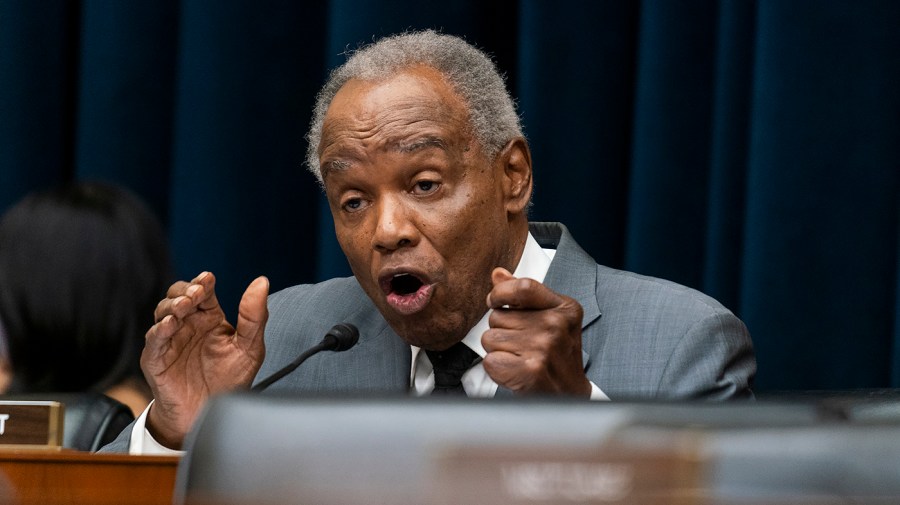
House Agriculture ranking member David Scott (D-Ga.) could become the latest Democrat in the chamber to lose his committee leadership spot in the wake of the 2024 election.
Facing dual challenges to his leadership from Reps. Angie Craig (D-Minn.) and Jim Costa (D-Calif.) in the 119th Congress, he could be the first Democratic leader in the chamber to outright lose a challenge if his bid to retain leadership fails. Judiciary ranking member Jerrold Nadler (D-N.Y.) and Natural Resources ranking member Raúl Grijalva (D-Ariz.) both relinquished their posts this month.
His potential loss could also tee up conflict with the Congressional Black Caucus (CBC), which counts Scott as a member and has historically backed seniority as a determinant of leadership — although its members have recently signaled they could be open to challengers.
The two challengers to Scott, who has led the committee’s Democrats since 2021, are both considered moderates within the caucus but have disparate levels of experience. Costa, first elected in 2004, is the No. 2 Democrat on the panel in seniority, while Craig, elected in 2018, is the third least senior.
Scott has been sidelined by health issues, missing two weeks of votes in November due to treatment for a back injury, a similar situation to that of Grijalva, who underwent cancer treatment earlier this year. But while Grijalva ultimately decided to step back and in December endorsed Rep. Melanie Stansbury (D-N.M.) to take over as ranking member of the Natural Resources Committee after initially pledging to seek another term, Scott has vowed to continue vying to keep his position, saying last week that “it’s in God’s hands.”
Age is a notable elephant in the room amid the challenges — Scott, Nadler and Grijalva are all over 75 years old, and the leadership shuffle comes after an election season marked by panic over the fitness of President Biden, the oldest president in U.S. history, which eventually led him to abandon his reelection bid in July.
The party’s broader reckoning over its losses in the election and how it can move forward also looms large over the shake-up.
Craig, in a Nov. 25 letter to colleagues announcing her candidacy for the House Agriculture ranking member position, said the electoral results indicate “we’ve got real work to do as Democrats to prove to the American people that our policies are the ones that make a difference, especially for those in rural communities.”
Costa announced his own bid in similar terms, writing on Nov. 21, “As someone who has represented a rural, agriculture-focused district through a coalition of bipartisan support, I understand how to represent rural Americans. The Agriculture Committee can, and should, be better utilized as the link to rural America and to showcase what our Caucus stands for.”
Scott’s district, Georgia’s 13th, is in the metro Atlanta area and is 93 percent urban, according to the U.S. Census Bureau.
The CBC has long backed seniority as a primary factor in leadership due to Black members’ historical difficulties attaining the posts. The caucus, which will have a record 62 members in the next Congress, will wield considerable influence in determining leadership.
At a press conference last week, however, CBC leaders suggested seniority should not be treated as the deciding factor.
“While we have and will continue to defend the seniority, we’re also going to make sure that we have the absolute best person serving,” said Rep. Troy Carter (D-La.), the CBC’s incoming first vice chair. He explained that while “seniority is a major part of the program … seniority without competence or ability is a challenge. We will give deference to seniority, but we want the very best person to serve, so sometimes it may not necessarily be in that order.”
Rep. Jonathan Jackson (D-Ill.), a member of both the CBC and Agriculture Committee, expressed similar sentiments, telling The Hill on Wednesday that he intended to back Scott for another term as ranking member but had no objections to the leadership challenge.
“I encourage healthy debates, I’m glad people are coming forth to exert their leadership,” Jackson said. “We’re on the same team, we’re going the same direction. I don’t see a major difference between the candidates.”
Jackson is one of eight CBC members on the committee, including Scott.
Whoever is selected as the top Democrat on the committee is likely to be in leadership during the negotiation of a new farm bill after Congress extended the 2018 Trump-era bill another year in 2023 and is all but certain to do the same into 2025. House Republicans, who passed their own proposal for a new longer-term version of the bill out of committee earlier this year, rejected a proposal from Senate Agriculture Committee Chair Debbie Stabenow (D-Mich.) in late November.
Democrats and Republicans have long been deadlocked over reference pricing, or the subsidies paid to farmers when crop prices fall below a certain threshold, as well as the Supplemental Nutritional Assistance Program. But the incoming Republican trifecta in 2025 will likely clear the way for a new farm bill more favorable to GOP preferences.

